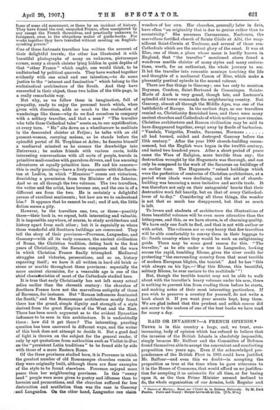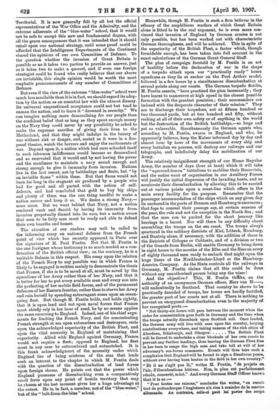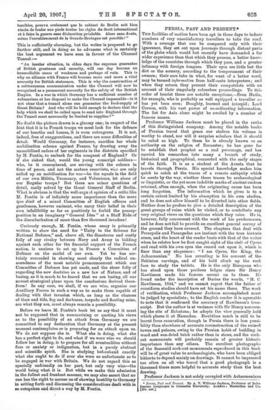RAID OR INVASIONP—A FRENCH OPINION.* THERE is in this country
a large, and, we trust, ever. increasing, body of opinion which has refused to believe that the invasion of the British Islands is absolutely impossible, simply because Mr. Balfour and the Committee of Defence found themselves able to accept the convenient and comforting proposition two years ago. Even if the acknowledged pre- ponderance of the British Fleet in 1905 could have justified Mr. Balfour—and even this we doubt—in accepting the proposition as true at the time when he gave utterance to it in the House of Commons, that would afford es no justifica- tion for accepting it as axiomatic for all time, or for basing upon it, as the then Prime Minister seemed inclined to do, the whole organisation of our Armies, both Regular and • Guerra et Karim, Ewa ear VITnili de is Wow Nationoic By M, raul
Poplin. Paris and Nancy Berger-Larra tilt *t [2 fr, a] Territorial. It is now generally felt by all but the official representatives of the War Office and the Admiralty, and the extreme adherents of the " blue-water " school, that it would not be safe to accept this new and fundamental dogma, with all the grave consequences that it was intended that it should entail upon our national strategy, until some proof could be afforded that the Intelligence Departments of the Continent shared the opinions of our own Committee of Defence. To the question whether the invasion of Great Britain is possible or no it takes two parties to provide an answer, just as it takes two to make a quarrel, and if even one foreign strategist could be found who really believes that our shores are inviolable, this single opinion would be worth the most emphatic pronouncements of any number of Committees of Defence.
But even if the view of the extreme "blue-water" school were much less assailable than ibis in fact, we should regard its adop- tion by the nation as an essential law with the utmost dismay. Its universal unquestioned acceptance could not but tend to unman the nation, and to leave it "drowned in security." We can imagine nothing more demoralising for our people than the confident belief that as long as they spent enough money on the Navy they could never by any possibility be asked to make the supreme sacrifice of giving their lives to the Motherland, and that they might indulge in the luxury of war without risk or danger, and, seated as it were in a fire- proof theatre, watch the horrors and enjoy the excitements of war. Depend upon it, a nation which had once schooled itself to such inhuman indifference would become so demoralised and so enervated that it would end by not having the power and the manliness to maintain a navy Bound enough and strong enough to give it immunity from invasion. Nations live in the last resort, not by battleships and fleets, but "by an invisible flame" within them. But that flame would not burn for long in the stagnant air produced by a people who bad for good and all parted with the notion of self- defence, and had concluded that gold to buy big ships and plenty of them was the one thing needful to make a nation secure and keep it so. We desire a strong Navy,— none more. But we want behind that Navy, not a nation rendered weak and flaccid by having its immunity from invasion perpetually dinned into its ears, but a nation aware that men to be fully men must be ready and able to defend their own hearths and homes.
The attention of our readers may well be called to the informing essay on national defence from the French point of view which has recently appeared in Paris over the signature of M. Paul Fontin. Not that M. Fontin is the one foreigner whose testimony is so much needed as a con- firmation of the British official view ; on the contrary, he is a veritable Balsam in this respect. His essay upon the relation of the French Navy to any possible war in which France is likely to be engaged is written mainly to demonstrate the thesis that France, if she is to be saved at all, must be saved by the operations of her Army rather than of her Navy, and that it is better for her to put every available man and every son into the perfecting of her mobile field forces, and of the permanent defences of her Eastern frontier, rather than to starve her Army and ruin herself by spending extravagant sums upon an ocean- going fleet. But though M. Fontin holds, and holds rightly, that it is upon land and not upon naval forces that France must chiefly rely in her hour of need, he by no means applies the same reasoning to England. Indeed, one of his chief argu- ments for limiting the French Navy, and for concentrating French strength at sea upon submarines and destroyers, rests upon the acknowledged superiority of the British Fleet, and upon the vital necessity to England of maintaining that superiority. Allied with England against Germany, France would not require a fleet; opposed to England, her fleet must in any case be outnumbered and outmatched. It is this frank acknowledgment of the necessity under which England lies of being mistress of the, seas that lends such an interest to the chapter in which M. Fontin deals with the question of the disembarkation of land forces upon foreign shores. He points out that the power which England possesses of disembarking even a comparatively small force upon any point of hostile territory that may be chosen at the last moment gives her a huge advantage at the outset. He is, in fact, a member, not of the "blue-water," but of the " bolt-from-the-blue " school. Meanwhile, though M. Fontin is such a firm believer in the efficacy of the amphibious warfare of which Great Britain alone is fitted to be the real exponent, he is even more con- vinced that invasion of England by German armies is not only possible, but has been worked out with characteristic German thoroughness, and will be achieved. This in spite of the superiority of the British Fleet, a factor which, though formidable enough, has been taken into full account in the exact calculations of the German Great General Staff.
The plan of campaign foretold by M. Fontin is an act of hostility before the declaration of war in the shape of a torpedo attack upon our "practically ready" home squadrons as they lie at anchor on the Port Arthur model, followed in a few hours by a simultaneous disembarkation at several points along our coasts. The German torpedo flotilla, M. Fontin asserts, "have practised the plan incessantly ; they have learnt to manceuvre at high speed in the closest possible formation with the greatest precision ; their commanders are imbued with the desperate character of their mission." They are to discharge their torpedoes, not at fifteen hundred or two thousand yards, but at two hundred and fifty, without reeking at all of their own safety or of anything in the world but the destruction of the British battleships,—so huge and yet so vulnerable. Simultaneously the German agents who, according to M. Fontin, swarm in England, and who, he apparently believes, keep the Kaiser informed day by day and almost hour by hour of the movements of every ship and every battalion we possess, will destroy our railways and our telegraphs, and indefinitely delay the mobilisation of our Army.
The relatively insignificant strength of our Home Regular
Army, the number of days (four at least) which it will take the "squeezed-lemon" battalions to mobilise their Reservists, and the entire want of organisation in our Auxiliary Forces will justify the initial dispersion of the invading hosts, and so accelerate their disembarkation by allowing this to be carried out at various points upon a coast-line which offers in the main every facility for the purpose. Remember that the
accommodation of the ships which on any given day
lie anchored in the ports of Bremen and Hamburg is enormous ; that fogs to conceal their passage aip, at certain seasons of the year, the rule and not the exception in the North Sea; and that the men can be packed for the short journey like herrings in a barrel. Nor will there be any difficulty about assembling the troops on the sea coast. The troops alway's quartered in the military districts of Kiel, Lubeck, Hamburg, and Dantzig alone, if necessary, with the addition of those in the districts of Cologne or Coblentz, and of a division or two. of the Guards from Berlin, will enable Germany to bring down in eight hours to the mouths of the Elbe and the Ems an army of eighty thousand men ready to embark that night upon the huge liners of the Norddeutscher-Lloyd or the Hamburg.. America Company. As the State controls all the railways in Germany, M. Fontin claims that all this could be done without any unauthorised person being any the wiser !
And the objective ? This, M. Fontin thlks, on the
authority of an anonymous German officer, Herr von H—, will undoubtedly be Scotland. That country he shows to be practically denuded of troops, her towns are hardly fortified, the greater part of her coasts not at all. There is nothing to- prevent an unopposed disembarkation even in the majority of her recognised ports :—
" Not thirty-six hours will pass between the moment when the order for concentration goes forth in Germany and the time when the troops actually disembark upon Scottish soil. Once landed,
the German army will live with ease upon the country, levying contributions everywhere, and taking ransom of the rich cities of
Aberdeen, Edinburgh, and Glasgow The British Fleet will be forced to undertake a (dose blockade of her own coasts to prevent any further landings, thus leaving the German Fleet free in her tarn to range the high seas and take toll at will of her adversary's sea-borne commerce. Events will thus take such a complexion that England will be forced to sign a disastrous peace, without ever having been beaten in the field in her own country." "Et il ne s'agit pas lh," writes M. Fontin, "de projets en Pair, d'elucubrations hAtives. Non, le plan eat parfaitement resole, concerto, mfiri." And every German Staff Officer knows that it is so :— " Pour toutes me raisons," concludes the writer, "on anrait tort de pretendre qua PAngleterre n'a rien a craindre de la marine, allemande. An cent:mire, cello-ei pent lni porter des coups.
terribles, pourvu seulement qua le cabinet de Berlin soit bien resoln de fouler aux pie& toutes les rheas du droit international et it fake la guerre sans declaration prealable. _tilers sans doute, mime Fenvahissement de la Grande-Bretagne eat possible!"
This is sufficiently alarming, but the writer is prepared to go further still, and in doing so he advances what is certainly the best argument we have seen in favour of the Channel Tunnel:— "An insular situation, in olden days the supreme guarantee of British greatness and security, will one day become an irremediable cause of weakness and perhaps of ruin. This is why an alliance with France will become more and more a vital necessity for British statesmen. This is why the construction of a subterranean communication under the Channel will now be recognised as a paramount necessity for the safety of the British Empire. In a war in which Germany has a sufficient number of submarines at her disposal to make the Channel impassable—is it not clear that a tunnel alone can guarantee the food-supply of Great Britain? And who will be bold enough to declare that the help which we shall be called upon to send into England through the Tunnel must necessarily be limited to supplies ? "
No doubt the picture drawn is a gloomy one ; in respect of the hint that it is to French troops we must look for the defence of our hearths and homes, it is even outrageous. It is not, indeed, free of exaggerations, and there use some difficulties of detail. Would Germany, for instance, sacrifice her whole mobilisation scheme against France, by drawing away the unmobilised cadres of her regiments in the districts specified by 14. Fontin, to embark for the conquest of England P Or if she risked that, would the young conscript soldiers— who, be it remembered, are serving with the colours in time of peace, and not the mature reservists, wlic: are only called up on mobilisation for war—be the equals in the field of our own Militia, Yeomanry, and Volunteers, let alone of our Regular troops ? But these are minor questions of detail, easily solved by the Great General Staff of Berlin. What is obvious is that the well-argusd opinion of a critic like N. Fontin is of infinitely more importance than the mere ipse dizit of a mixed Committee of English officers and gentlemen, however eminent, who carry their belief in their own infallibility so far as positively to forbid the presup- position in an imaginary "General Idea" at a Staff Ride of the disembarkation of more than five thousand invaders !
Curiously enough, X. Fontin, whose essay is primarily written to show the need for "Unity in the Scheme for National Defence," and, above all, the disastrous and costly folly of any rivalry between Navy and Army in bidding against each other for the financial support of the French nation, is anxious to set up in France a Committee of Defence on the model of our own. Yet he has cer- tainly succeeded in showing most clearly the radical un- soundness of the most notable pronouncement which our Committee of Defence has yet made, and the sheer folly of regarding the new doctrine as a new law of Nature, and of basing, as it is much to be feared that we are basing, all our newest strategical plans upon the conclusions derived there- from! In any case, we shall, if we are wise, organise our Auxiliary Forces in such a way as to make them capable of dealing with that invasion which, as long as the chances of time and tide, fog and darkness, torpedo and floating mine, are what they are, must always remain a possibility.
Before we leave N. Fontin's book let us say that it must not be supposed that in summarising or quoting his views as to the possibility of an attack from Germany we are committed to any declaration that Germany at the present moment contemplates or is preparing for an attack upon us. We do not suppose she is. What she is doing, what she has a perfect right to do, and what if we were wise we should follow her in doing, is to prepare for all eventualities without fuss or anxiety or indignation, but in a purely abstract and scientific spirit. She is studying beforehand exactly what she ought to do if ever she were so unfortunate as to be engaged in war with Britain. We do not regard this as specially unfriendly on her part, but only very wise—the world being what it is. But while we make this admission in the fullest and frankest manner, we may also assert that no one has the right to accuse us of showing hostility to Germany in setting forth and discussing the considerations dealt with in so outspoken and direct a way by N. Fontin.












































 Previous page
Previous page